
States' priorities
Note: Some responses have been edited for length and/or clarity.

Alabama
Implementation of an 18-month exam cycle for state chartered credit unions.
Establishing Prize-Linked Savings Accounts for credit unions in Alabama. Our credit unions want to educate state legislators about the need to educate and promote savings for credit union members.
Supporting legislation aimed at regulating the growing payday and title lending establishments in Alabama. Recently, Alabama has had more payday and title lenders per capita than any other state in the country.
We made important strides for credit unions in Alabama and Florida in 2016, and we intend to build on that momentum in 2017 with very proactive legislative agendas. We have an opportunity in Alabama to provide regulatory relief to credit unions through the implementation of an 18-month exam cycle, as well as working to curb the influence of predatory lenders and encourage saving. -

Alaska
Additionally, the Alaska Legislature is considering a bill related to the ride-sharing app Uber that failed last session but seems to have more legs this session.

Arizona, Colorado and Wyoming
A highlight last year was taking a group of credit union professionals from our three states on a visit to Congressional leaders in Washington, D.C. the week of Sept. 12. In addition to meeting with some of our regular delegation, the group met with Speaker Paul Ryan, Majority Leader Kevin McCarthy and his key staff, the Majority Whip Steve Scalise, and Deputy Majority Whip Patrick McHenry.
The group also met with Financial Services Committee Chairman Jeb Hensarling and Foreign Affairs Committee Chairman and longtime credit union champion Ed Royce. The conversations included discussing credit union issues, but also took included the opportunity to hear their plans and concerns for this Congress and what changes they anticipate after the election in November.

Arkansas
In Arkansas, several bills have been filed that would amend tax law, specifically income tax and sales and use tax. One of the bills would tax certain “digital products” and our concern is that credit unions would be subject to paying tax on the specified digital products and codes. Another bill would permit all credit unions to apply to hold public funds and reaffirms that all banks are eligible to apply.

California
Cannabis Banking—The California League is serving as a resource to the state Treasurer’s office and others on the federal barriers that restrict credit unions’ ability to serve legal cannabis businesses.
Arbitration Clauses—California legislators are looking into arbitration clauses as a fix to some of the fraudulent activity from large banks.
Affordable housing—A top agenda item for legislators this session; they are looking at a number of ways to address the problem of housing affordability.
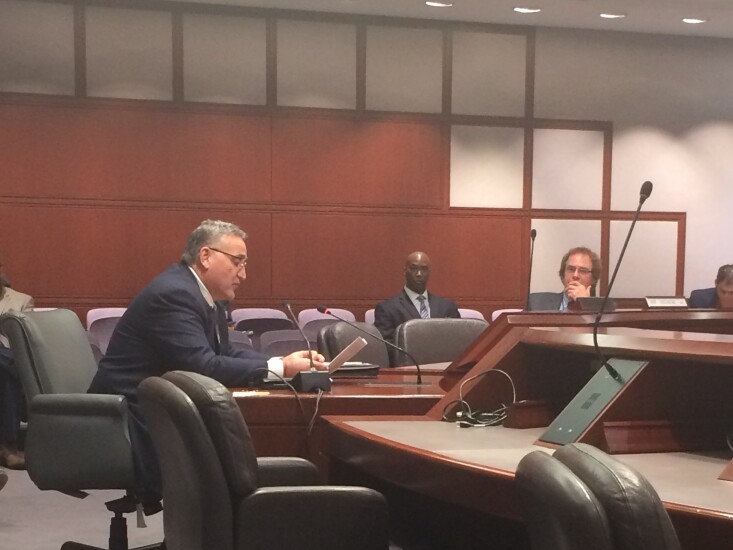
Connecticut
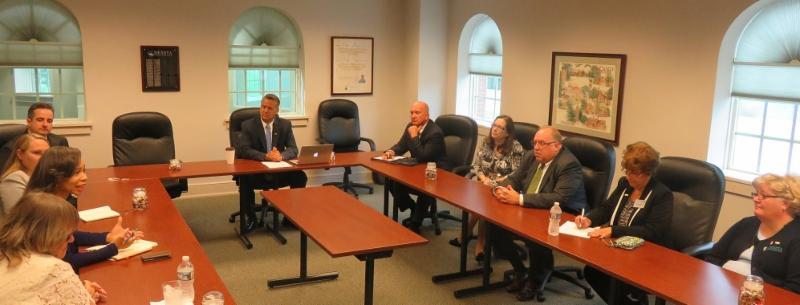
Delaware
Delaware’s credit unions promote awareness with their state lawmakers through membership in the Small Business Caucus. This group of key lawmakers meets with small business owners to discuss current and pending legislation while Delaware’s legislature is in session. In addition to providing credit union professionals with an opportunity to increase awareness of the value of credit union membership, the executives have an opportunity to establish and deepen relationship with their local legislators.
Ever vigilant on behalf of their members, the credit unions of Delaware are a proud resource for their local lawmakers. From enacting legislation to ensure financial literacy education is available to all students; to expanding legal protections related to online privacy and protection; and to providing a mechanism for financial institutions to freeze transactions when financial exploitation of an elderly person is suspected—Delaware’s legislators know that protecting the most vulnerable of the state’s residents will ensure the financial well-being of all its residents.
Pictured above: CCUA President/CEO Paul Gentile and Delaware credit union execs meeting with Delaware Congresswoman Lisa Blunt Rochester

Florida
Allowing Florida credit unions to accept public deposits.
Adding financial literacy to high school graduation requirements.
Protecting credit unions from lawsuits under the Florida Unfair and Deceptive Trade Practices Act.
We made important strides for credit unions in Alabama and Florida in 2016, and we intend to build on that momentum in 2017 with very proactive legislative agendas. In Florida, we want credit unions to have an equal opportunity to serve their communities by accepting public deposits and have taken the lead in making that happen.

Georgia
Operational Improvements to Credit Union Charter: HB 143 by Rep. Bruce Williamson (R-Monroe) contains multiple provisions for credit unions that are a direct result of dialogue between the Department of Banking and Finance and a credit union task force that met in the summer of 2016. The enhancements in the bill include flexibility on audit requirements for smaller credit unions, field of membership enhancements, clarification of nonmember deposits, operational improvements to permitted investments, merger votes, and improvements to fixed asset requirements.
Prized Linked Savings: “Save Earn Win Bill” SB 134 by Sen. David Shafer (R-Duluth) is an issue that GCUA has been in dialogue with the senator prior the session to institute the ability for credit unions to offer prize-linked savings accounts.
Board of Director Protections: HB 192 by Rep. Beth Beskin (R-Atlanta) is a credit union-supported bill that seeks to strengthen the business judgment rule for financial institutions and strengthen the protections of board members from charges of “ordinary negligence” in their decision-making, leaving them liable only for gross negligence, fraud or bad faith.
In addition to the lobbying efforts, the Georgia CU Association holds two events in conjunction with the session: the State GAC/Grassroots Academy, an educational event for credit unions that was held on Jan. 24 and a credit union reception for all legislators on Feb. 7. This reception is held to create the opportunity to engage the industry with elected leaders and develop in-person connections.
Pictured above: Attorney General Chris Carr stands with President/CEO of Georgia Credit Union Affiliates Mike Mercer at the GCUA Legislative Reception.

Idaho/Oregon/Washington
Washington’s not-for-profit, cooperative credit unions drove $5.5 billion in economic impact to the Evergreen State. That includes $369 million in direct benefits to members — a story only not-for-profit credit unions can tell. The messages were delivered on iced cookies, a tradition the legislators love.
Last month, advocates met with lawmakers in Boise and continued productive dialogue advocating for a progressive charter all in the interest of member services.
At the upcoming CUNA GAC and at Oregon’s Credit Union Day, the headline will continue to be the positive economic impact only not-for-profit credit unions can deliver. As well, we support legislation promoting common sense regulation that frees credit unions up to focus more on member service. And why not? Six million Northwest members—nearly 50% of the population — enjoy the credit union difference. Our focus is on raising awareness and removing unnecessary regulatory barriers, so millions more can benefit from CU membership. Idaho credit unions converged on the state capitol for their day at the legislature last month. There was a good atmosphere and lots of productive dialogue with lawmakers. The legislative session there is going well.

Illinois
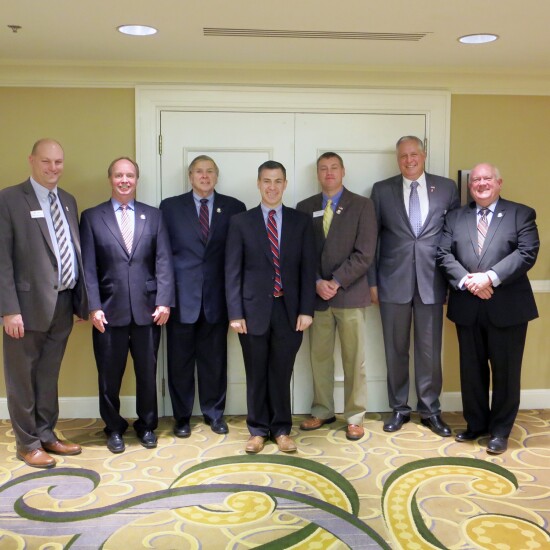
Indiana
Pictured above: Freshman Congressman Jim Banks (IN-3) attended the Indiana League’s Legislative Affairs Forum on Feb. 13. He is shown with members of the League board and leadership. From left: League SVP Governmental Affairs Chris Beaumont; League President John McKenzie; League Director David Abernathy, Via CU; Rep. Banks; League Director Doug True, FORUM CU; League Board Secretary / CUNA Board Member Dallas Bergl, INOVA FCU; League Board Treasurer Kevin Ryan, Financial Center First CU.

Iowa

Kansas
HCUA and member credit unions continue their educational efforts on the purpose and value of the state’s tax exemption for credit unions. As the legislature looks to close a continuing shortfall in the state budget (currently at $350 million), all revenue opportunities and tax exemptions are on the table. As not-for-profit financial cooperatives, Kansas credit unions do not pay the privilege tax that for-profit banks pay on their retained earnings.
HCUA Advocacy is working in conjunction with the state regulator on guidelines for the launch of prize-linked savings accounts in Kansas. HCUA helped pass legislation last year to permit state-chartered credit unions to offer PLS accounts, and HCUA has partnered with the Save to Win program for a roll-out of PLS accounts by Kansas credit unions.
A record crowd of 191 Kansas credit union advocates shared these priorities and credit union successes with lawmakers during Credit Union Day at the Capitol in Topeka on Feb. 15.

Kentucky

Maine
Pictured above: Rep. John Picchiotti, who also serves as Chair of the Board at KSW FCU, and John Murphy, President of the Maine CU League, at a pre-session event the League held for legislators.
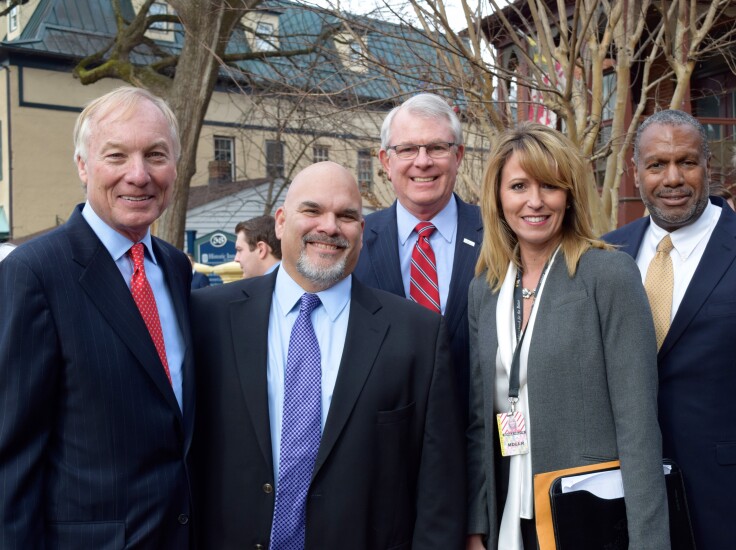
Maryland/District of Columbia
In Maryland, the General Assembly is debating two competing bills on paid leave, one in which the employer threshold (to pay for employee leave) would kick in at 15 employees, and another proposed by the Governor with the threshold kicking in at 50 employees. Unlike the District, the employer would be responsible for administering and paying the employer. With the governor’s support, some version of paid leave is expected to pass before the legislature adjourns in mid-April. The MD|DC Credit Union Association is engaged with legislators and stakeholders in both jurisdictions on the issue.
Pictured above: Maryland Comptroller Peter Franchot, MD|DC CUA President/CEO John Bratsakis, SECU President/CEO Rod Staatz, Maryland Dept. of Labor, Licensing & Regulation Secretary Kelly Schulz, & Lorenzo Bellamy, Alexander & Cleaver.-
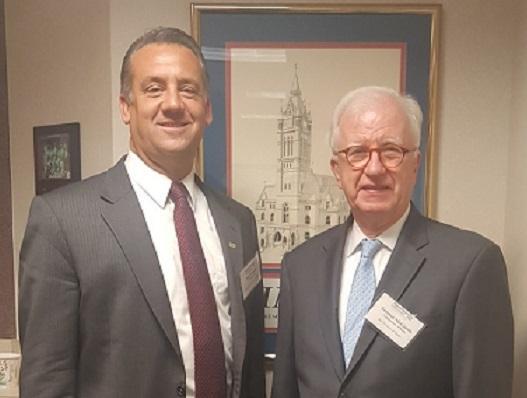
Massachusetts
CCUA strongly advocated for change before the Massachusetts Legislature and provided a combination of written and oral testimony on 41 bills covering key credit union issues. Support was provided on such issues as patent reform, financial literacy, and data breach legislation; opposition on such issues as mortgage disclosures, interchange, and judicial foreclosure requirements.
Significant improvements were made in state regulation—five of 26 regulations repealed, 12 amended, and a new parity regulation to include supplemental capital authority. CCUA launched a key partnership with the MA Secretary of Consumer Affairs and Business Regulation, resulting in the development of an online ATM Skimming Toolkit.
Pictured above: CCUA President/CEO Paul Gentile with Massachusetts Commissioner of Banks Terence McGinnis
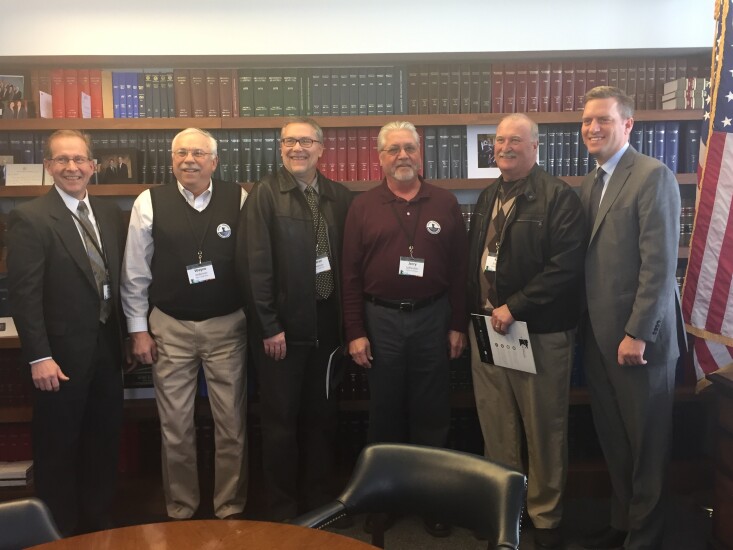
Minnesota
In addition, Minnesota Credit Unions are pushing for the following specific initiatives this session:
* Support of a bill that includes state credit union charter enhancements and common-sense regulatory relief
* Working with the State Realtors Association on the Minnesota Home Buying Savings Act: a first-time homebuyer savings account to provide Minnesotans who want to become homeowners with tax incentives to save for the purchase of a first home within the state
* Working with law enforcement to ensure that financial institutions are able to share the proper information for them to charge and prosecute
* Support of changes to forfeiture statutes in order to protect lienholder rights in DWI instances.
Pictured above: Representatives from Minnco CU and Minnesota Speaker of the House Kurt Daudt.

Missouri
HCUA Advocacy is also working in support of a bill to fund technology upgrades for the Department of Revenue to implement electronic lien and title (ELT) technology.
HCUA Advocacy is closely monitoring a number of bills that may negatively impact credit unions, including changes to Missouri’s foreclosure process, legislation exposing credit unions to potential lawsuits for prohibiting guns on the premises, and others.
Missouri credit union advocates shared these concerns and credit union successes with lawmakers during Credit Union Day at the Capitol in Jefferson City on Feb. 1.

Montana
The state’s credit unions are also keeping a close eye on a bill to amend the concealed carry laws to allow individuals with the concealed carry license to carry a gun into a financial institution.
But no matter what issues are being debated, a primary focus for the Montana Credit Union League is in developing relationships with lawmakers and even other lobbyists to make sure that credit unions are always part of the conversation.

Nebraska
In addition to supporting these bills and several others, the league will be fighting bills harmful to Nebraska credit unions. Legislative Bill 52 would create the “Modern Tax” and levy a 5.5% tax on the interest paid on qualified loans which would include home mortgages, car loans, personal loans, credit cards and others. Legislative Bill 559 would prohibit the collection of interchange fees on the taxes or fees charged on an electronic payment transaction.
Pictured above: State Senator Dan Quick; Gene Siadek, Director with Family Focus FCU; Steve Edgerton, VP Operations & GA Officer with Centris FCU.
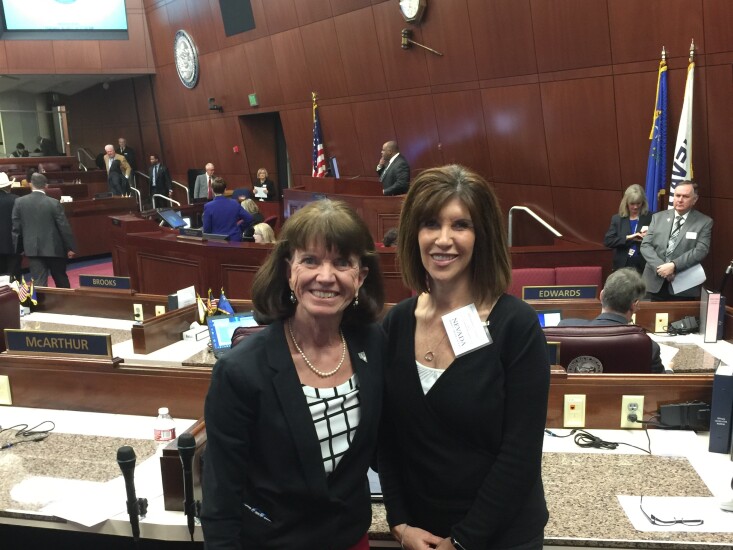
Nevada
HOA super-priority lien—the Nevada League continues to have conversations about the impact of the Nevada homeowners’ association (HOA) super-priority lien and the risk the HOAs’ ability to extinguish a first mortgage has on credit unions and other financial institutions. The super-priority lien allows HOAs to foreclose on a property to collect delinquent assessments and extinguishes all other liens on the property.
Green Energy Financing Program: A bill has been introduced and the Nevada League is working with the governor’s office to make sure consumers are protected when receiving these types of loans.
Pictured above: Financial Horizons CU (Hawthorne, NV) EVP Theresa Lupori with Nevada state Assemblywoman Robin Titus on the Assembly Floor on Feb. 15—the date of the Nevada Credit Union League Government Relations Rally in Carson City, NV.
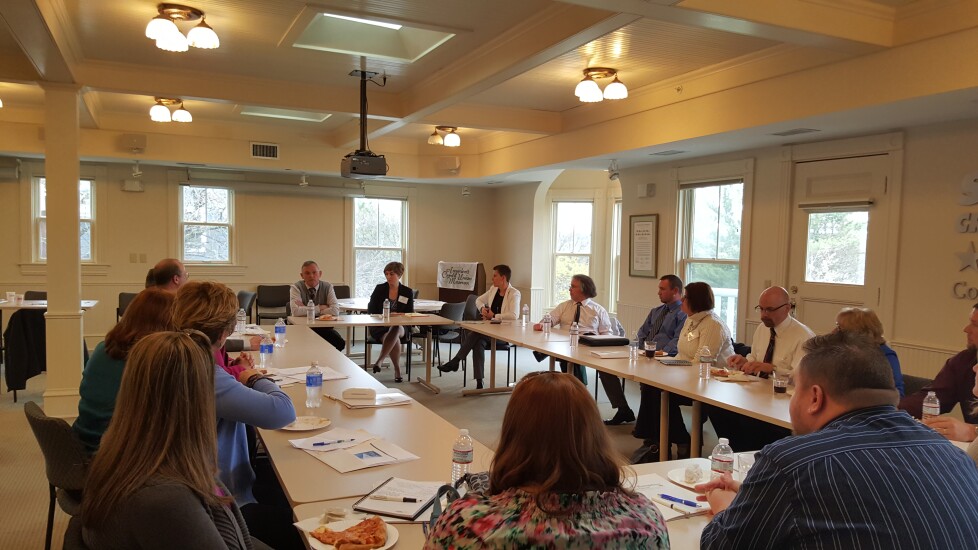
New Hampshire
Judicial victory scored by New Hampshire credit unions and other mortgage lenders in the Pinewood Estates Condominium Association case before the New Hampshire Supreme Court. The Cooperative Credit Union Association, Inc. joined the New Hampshire Housing Finance Authority and other lenders in a legal challenge to represent the interests of credit unions. The Supreme Court reversed the Superior Court’s decision marking a significant victory for credit unions offering condominium loans. The victory gives lenders a clear understanding of the risks involved in extending condominium mortgage financing. This result protects the interests of not just lenders, but also existing associations, unit owners and developers. It also ensures continued growth and availability of condominiums in New Hampshire.
Dedicated advocacy resources to protecting credit union rights in the world of emerging technology, such as with lien-holder notification relative to Uber and other transportation network companies.
Pictured above: New Hampshire credit unions meet with representatives from New Hampshire Banking Department and New Hampshire Bureau of Elderly and Adult Services.

New Jersey
Firstly, we got legislation enacted in January 2016 to enable credit unions to offer prize-linked savings accounts, so we’re lobbying the Division of Banking to adopt the final rules that will impact the state-chartered credit unions.
Secondly, there’s a bill that has to do with kill switches [remote shut-off devices that can be used on delinquent auto loans] that would have prevented those in New Jersey. We worked with the sponsor of the bill and got the sponsor to change it from an outright ban on them to setting up some parameters [around interest rate caps whether or not borrowers can be charged the device].
That bill has passed both houses of the legislature but received a conditional veto from the governor, who sent it back to the legislature. The Assembly has blessed the new language and we’re waiting for the Senate to do the same.
The three other areas we’re focused on are a state interchange bill; legislation that would mandate the motor vehicle commission to adopt electronic lien and titling; and a data breach bill that we’ve pushed for a number of sessions which limits the data a retailer can retain after the sale, authorizes a card user to identify the breaching entity and provides for recovery of associated costs.

New Mexico
A Data Breach Notification Act has been unanimously adopted by our House of Representatives and we are now moving into the Senate. New Mexico has no protection for consumers who are victims of data breaches, and we feel this legislation will go a long way to provide consumer protection and assist in reducing fraud losses.
A CDFI bill is now moving through several legislative committees. The bill would establish a CDFI fund to assist with economic development in the state. We have a number of CDFI credit unions and this bill would create a new mechanism designed to grow the economy.
Finally we are supporting a bill that would end the practice of municipalities seizing the property of individuals charged, but not convicted of a crime. This practice results in legal and lawful lien holders forfeiting collateral, such as autos, that have been pledged to secure a loan.

New York
Gov. Andrew Cuomo has laid out an ambitious wish list of items he’d like the legislature to take up this session, some of which intersect with our legislative agenda. For example, in recent public comments, the governor has supported expanding ride-hailing services throughout the state. He’s also expressed support for new cybersecurity requirements, which the state Department of Financial Services recently finalized.
NYCUA will work to ensure that any ride-hailing legislation contains a requirement for adequate insurance coverage and an equitable regulatory framework.
On the data security front, we’ll continue to push for higher merchant security standards, increased flexibility with respect to consumer notification, and the ability to seek restitution from the responsible party in the event of a data breach.

North Carolina and South Carolina
In North Carolina, league-supported measures that could not overcome late-2016 political standoffs are expected for reintroduction. Among those are technical corrections and conforming changes that address escrow and bond accounts for credit unions, giving them parity with banks in several areas and providing consumers a wider array of financial institution choices when conducting business with public and private entities. Also, improvement in regulatory flexibility for state-chartered credit unions would extend the current annual exam cycle to 18 months.
The league also looks to make long-needed updates to the South Carolina credit union charter and improve an environment in which only 11 state-chartered credit unions operate. Active legislation would: (1) permit credit unions to offer certain services to certain nonmembers; (2) clarify procedures for adding community groups; (3) provide flexibility for boards to meet ten times per year rather than monthly and allow for remote participation; and (4) permit credit union investment in certain charitable donation accounts. The League has called for staff and member grassroots communication urging legislator support amid banker objection.

North Dakota
Trump, who took over 63% of the vote in the state, directly led to many veteran, incumbent Democratic down-ticket legislative races being impacted.
Most notably, the Democrats lost both of their minority leaders in the Senate and House. Probably even of a more demoralizing hit for the party was the loss of their party chairwoman.
And if that weren’t enough, they also lost their long-time former Senate minority leader as well. All told, seven key Democrat incumbents lost in the state Senate, and eleven Democrat incumbents lost in the state House. The Republicans currently hold a massive majority in both chambers with an 81 to 13 seat advantage in the House, and 38 to 9 seat advantage in the Senate.
This means that there are 36 new or first-time legislators this session, with nine in the Senate and twenty-four in the House. That kind of turnaround in an election cycle does present a challenge for credit union advocates in educating new legislators on the credit union difference. This makes any new legislation that we would want to move forward this session more difficult. Not impossible, but certainly more challenging.
Leading into the session, the Credit Union Association of the Dakotas (CUAD) was working with the ND Department of Financial institutions on modernizing the state credit union statute, most notably the Member Business Lending rules. However, with the looming ICBA MBL lawsuit against the NCUA and ABA’s lawsuit over Field of Membership (FOM), the CUAD Advocacy team is proactively playing more of a defensive role this session.
The latest revenue forecast for the North Dakota biennium is $1.4 billion lower than the legislative forecast. So, as the state continues to bounce back from low returns on oil, coal and agriculture commodities, the new governor, Doug Burgum, and the assembly leadership are focused on reining in expenses and have called for an additional 2.5 percent reduction in General Fund spending this biennium.
That is in addition to previous cuts recommended by the outgoing governor’s administration with total General Fund spending cuts down 21 percent.
As it is, North Dakota is still rated AA+ by Standard and Poor’s. The unemployment rate of just three percent is still the third lowest in the nation, and we still have nearly 14,000 jobs that are open and available. Despite strong growth in assets, membership, and loans, we are anticipating a handful of significant credit union mergers in the state this year.

Ohio
* Biennial budget: Our governor has proposed a tax structure that could hamper state-chartered credit unions. We’ll be looking to ensure the current tax status/structure is protected/enhanced, and be ready for bank attacks on credit union tax structure throughout the budget process.
* Linked deposits: We had a pro-business lending bill that created parity between banks and credit unions that passed the house but fell short in lame duck in the Senate in 2016. We’ll look to get that across the finish line, either through a budget amendment or a standalone bill.
* CU code modernization: We’ll be working with the Ohio Department of Commerce and the Ohio General Assembly to update the Ohio credit union charter to ensure a more modernized operating framework is in place.
* Bank code modernization… We were successful in thwarting bank attempts to attack privately-insured credit unions and credit union use of the term “bank” as part of bank modernization language last General Assembly. We also pitted our linked deposit bill against their modernization in lame duck in a “if you don’t pass ours, don’t pass theirs” match. The same fight will surface this year.
* Webcam notarization: We have had several larger credit unions ask for more modern use of technology to allow for notarization of loan documents remotely via webcam. We are working with a coalition to make this happen
* Good funds: We are working with a coalition of other financial trades to raise the monetary cap that was recently placed on the use of certified/cashier checks during a real estate closing.

Oklahoma
In Oklahoma, we are advocating for a data breach bill that would give the state attorney general increased authority to seek damages from retailers who fail to report any data breach within a time certain. Other priority issues include perfection of liens, release of information to judgment creditors, and one to tighten regulations against the state’s wrecker industry and better protect lienholder interests.

Pennsylvania
We are also tracking legislation that strengthens protective measures for seniors, including financial abuses, and spot assessments legislation that strikes an appropriate balance between providing fair taxing policies for all property owners and allowing local taxing authorities to appeal assessments under appropriate circumstances. Of course, we are closely watching the state budget process to ensure credit union taxation does not become part of the conversation.
On the regulatory side, we are engaged in discussions with the Pennsylvania Department of Banking and Securities regarding NCUA’s new FOM and MBL rules, and their impact on state-chartered credit unions.
Finally, there are also several larger issues that we will be monitoring like pension reform, property taxes, and shale drilling taxation and regulation. Once again, we expect 2017 to be a very active year.
Pictured above: PCUA CEO Partick Conway, VP Gov. Relations Christina Mihalik and Senator Pat Toomey.
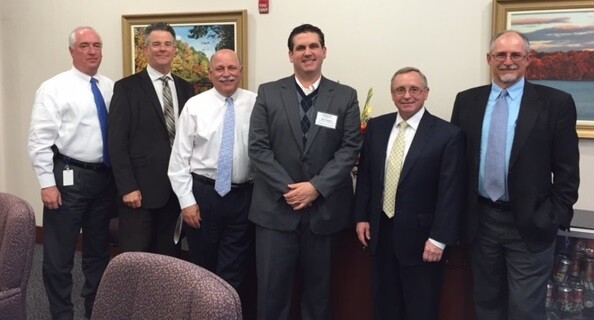
Rhode Island
While the campaign delivered its message primarily through radio, it also tapped advertising opportunities at the Dunkin Donuts Center in Providence and the state’s High School Basketball Championship Tournament.
Credit unions of Rhode Island also took the spotlight during the campaign’s popular “In Your Neighborhood” gatherings that saw consumers enjoying conversation and a coffee or sandwich paid for by credit unions.
The gatherings provided an ideal opportunity for credit union execs to engage consumers about their banking habits and preferences, and to educate them directly about the many ways credit union values make for a better banking experience.
Highly successful state legislative session with no negative credit union legislation enacted. Proposals adverse to credit unions were sent for further legislative study or stalled in chambers, including legislation on fines relative to foreclosure filings, fines on motor vehicle lessors relative to default procedures, increased notice requirements relative to automobile leases, and multiple restrictive foreclosure bills.
To combat the elder financial exploitation which continues to occur with increased frequency, a roundtable summit was launched to identify local concerns, issues and available resources.
Partners included representatives of the Rhode Island Division of Elderly Affairs, the FDIC with its Money Smart for Older Adults training and state credit union and securities regulators.
Pictured above: RI Credit unions with representatives from Rhode Island Department of Business Regulation during CCUA's Financial Elder Abuse program. L-R: Stephen Ormerod, VP, chief security officer, Navigant Credit Union; John Clarkson, AVP, Security, Pawtucket Credit Union; Gary Furtado, president/CEO, Navigant Credit Union; Matthew Gendron, legal counsel, Director's Office, Rhode Island Department of Business Regulation; Ken Poyton, president, PGE Federal Credit Union; and Don DeFedele, chief securities examiner, Rhode Island Department of Business Regulation.

South Dakota
The 2016 South Dakota election will be remembered as the year of the ballot question. Ballot questions are nothing new for voters in South Dakota, however this year’s ballot included ten separate ballot questions covering a wide range of topics.
The two receiving the most attention were Initiated Measure 21, which capped interest rates at 36% for payday lenders operating in the state, and Initiated Measure 22, which placed tight restrictions on lobbyists’ gifts to legislators and would have created a taxpayer-funded democracy credit system of campaign financing for legislative and statewide candidates.
Sections of IM 22 were subsequently ruled to be unconstitutional by Circuit Judge Mark Barnett.
Republicans hold supermajorities in both chambers and voted to repeal IM 22, which was immediately supported and signed by Governor Daugaard.
As a result, legislators from both parties are attempting to pass other stand-alone bills that keep faith with voters’ intent for reforms expressed in IM 22.
The fallout from IM 21, capping interest rates, had a rippling effect. The measure went into effect the day after the election, and many payday lenders across the state responded by closing their doors, and in many cases, calling loans due. Supporters of IM 21 called on credit unions in the state to fill the void left by the payday lenders.
Pictured above: Pat Tollefson, Aberdeen FCU, Jay Kruse, Credit Union Association of the Dakotas, and South Dakota Senator Scott Parsley.

Texas
Several thousand bills have been filed in Texas, and we expect many more by the filing deadline in early March. Priority issues include modernizing Texas home equity law, reducing government mandates, data security breaches, elder financial abuse, and maintaining the independent credit union regulator.

Vermont
Our association advocacy team reviews about 1,000 bills per legislative session for relevance or concern to credit unions.
Although none this year are aimed specifically at credit unions or initiated by them, there are many consumer protection-oriented bills that certainly have potential to affect credit union operations.
In addition, there are efforts to create a state-owned bank, which are being monitored very closely for significance to credit unions.
Lastly, legislators and a new administration are working to fill a budget deficit, which always keeps us on alert even though credit unions enjoy a very strong supportive position with statehouse legislators

Virginia
The state budget was the highest priority due to a shortfall partly attributable to federal sequestration.
Tax reform is certainly an option but there is no imminent credit union threat. We monitored about 60 bills due to their impact on credit union operations but it is fair to say 2017 will be a fairly uneventful year for state legislative issues in Virginia.
For that reason, we have chosen to focus on federal priorities and in particular regulatory reform. Restructuring the CFPB to ensure that the small financial institution exemption is enacted when appropriate is the immediate focus.





